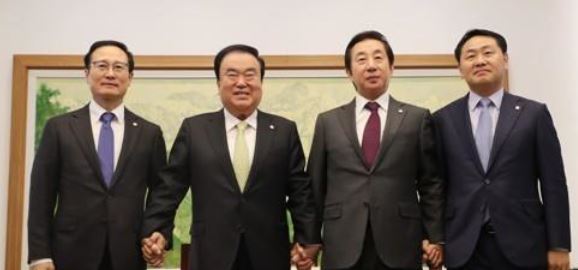Proposed special tribunal on judiciary power abuse stokes legal controversy
By Kim So-hyunPublished : Oct. 29, 2018 - 14:47
Lawmakers’ push to launch a special tribunal on the judiciary power abuse scandal involving a former top court chief is stoking controversy among legal experts over fairness and judicial independence.
Floor leaders of the ruling Democratic Party and three minor opposition parties said in a joint press conference last Friday that a special tribunal must be launched to “fairly handle” the allegations that former Supreme Court Chief Justice Yang Sung-tae led the abuse of judicial power.

Papers leaked from the National Court Administration early this year raised suspicions that NCA officials under Yang attempted to use politically sensitive trials to seek support from then President Park Geun-hye’s office for Yang’s bid to establish a court of appeal.
In August, lawmakers, including Rep. Park Ju-min of the Democratic Party, proposed a special bill to have three special judges preside over the first and second trials of the judicial power abuse allegations.
According to the bill, the Korean Bar Association, a council of judges and “knowledgeable and highly reputed” non-legal practitioners, or civic groups, would each pick three people to form a nine-person panel that will recommend twice the number of required special tribunal judges from the Seoul Central District Court. The Supreme Court chief justice would then appoint the special judges from the list of recommended judges.
The DP and the three minor opposition parties seek to get the bill passed next month, but some legal experts argue that it may be unconstitutional as nothing is stated in the Constitution in regard to the establishment of a special tribunal.
There is no clause about a special tribunal in the law on court organization either.
Those opposed to the special tribunal argue that it would violate Chapter 5, Article 101 of the Constitution which states that “judicial power shall be vested in courts composed of judges,” since the tribunal will be organized by politicians.
Having non-legal practitioners and members of the Korean Bar Association on the panel that recommends the judges is against the constitutional guarantee of judicial power, they argue.
Rep. Park and those who favor the special tribunal argue otherwise, noting that it is the Supreme Court chief justice who will ultimately form the special tribunal, and that the tribunal’s judges will picked from among incumbent judges.
Another point of contention is that, from the prospective defendants’ point of view, the special tribunal may infringe on their right to fair trial.
Many argue that the tribunal will be formed based on a predetermined notion that those implicated in the power abuse scandal are guilty.
The tribunal is likely to be swayed by public opinion in reaching its conclusion, instead of ruling based on evidence and their conscience as judges, they say.
“If it’s going to be formed according to the current bill, it would be like ruling on a case that has already been concluded,” a judge said.
Compared to regular courts where judges are randomly assigned cases, the special tribunal may lack fairness since it will comprise judges recommended by civic groups that do not trust the judiciary and the Korean Bar Association, which may see themselves as a victim of the alleged judicial power abuse, some opponents of the tribunal claim.
Those pushing for the tribunal say that this is not true, as the defendants can be tried three times like in other cases, and the same trial procedures will apply to them as well.
There is also an argument over whether it would infringe on judicial independence.
Senior Presidential Secretary for Civil affairs Cho Kuk wrote in a Facebook post on Saturday that the push for a special tribunal is “based on reasonable doubt that it will be difficult for the judges to rule fairly” on the alleged judicial power abuse case, prompting criticism that Cho, a legal scholar, was out of his line as a key presidential aide.
In a recent poll of 502 adults nationwide by Realmeter showed 3 out of 5 respondents favoring the establishment of a special tribunal for a fair trial on allegations against Yang.
By Kim So-hyun (sophie@heraldcorp.com)











![[Today’s K-pop] BTS pop-up event to come to Seoul](http://res.heraldm.com/phpwas/restmb_idxmake.php?idx=644&simg=/content/image/2024/04/17/20240417050734_0.jpg&u=)





![[KH Explains] Hyundai's full hybrid edge to pay off amid slow transition to pure EVs](http://res.heraldm.com/phpwas/restmb_idxmake.php?idx=652&simg=/content/image/2024/04/18/20240418050645_0.jpg&u=20240419100350)

